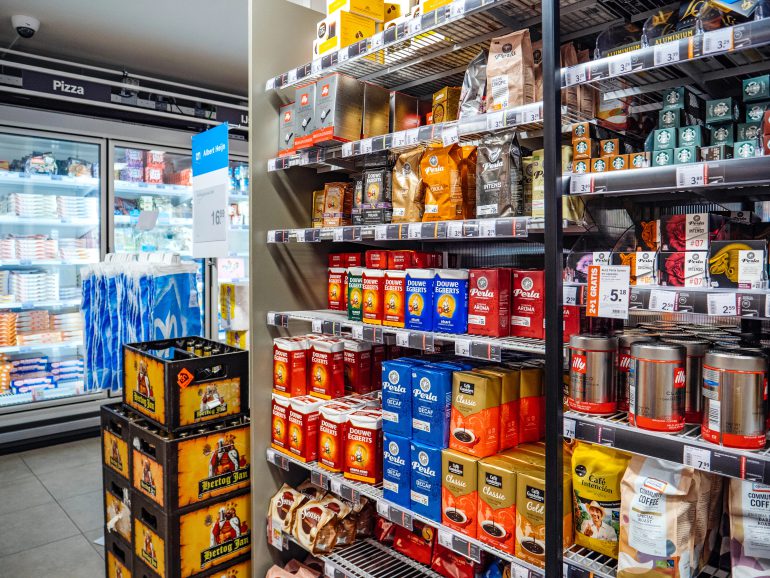Premium brands have experienced a notably difficult year in Dutch supermarkets. Well-known branded products saw a9% decline in supermarket sales in 2024 compared to the previous year, as revealed by research agency Circana.While part of this downturn was attributed to the ban on tobacco sales implemented in July 2023, premium brands still struggled significantly.
De Telegraaf newspaper highlights that the combined turnover for the top 100 brands dropped dramatically by €945million: from €10.91 billion in 2023 to €9.97 billion in 2024. For the first time, premium brands now represent less than afifth of total supermarket sales, down from nearly a quarter at the start of the century.
Marlboro, traditionally one of the top-ranking brands, saw a notable drop from first place to fourth in the top 100 list, directly attributed to the tobacco sales ban. This brand and nine other tobacco brands are expected to disappear entirely from supermarket shelves next year, significantly altering market dynamics.
Consumer habits
According to Irene Hendriksen, director of retail at Circana, changing consumer preferences significantly contributed to the decline. Consumers increasingly opt for fresh products, a segment where premium brands hold less influence, and are turning more to supermarket private labels, which are generally seen as equally good but considerably cheaper. One supermarket customer at Dirk in Hoofddorp stated: ‘Everyone has to watch the pennies. And private labels are often just as good quality.’
Fresh products represent one of the fastest-growing segments in supermarkets, reflecting a broader consumer shift towards healthier and more cost-effective options. Premium brands often struggle to compete effectively, as many fresh items are unbranded or marketed directly under the supermarket’s private labels.
Impact of delivery disruptions and conflicts
Delivery disruptions and disputes between manufacturers and supermarkets exacerbated the decline. Brands such as Bonduelle, Senseo, De Ruijter and Quaker temporarily vanished from major supermarkets, including Jumbo and Picnic, due to conflicts that directly affected their sales. Hendriksen notes: ‘If people find empty shelves due to such aboycott or delivery stop, they will either choose another brand or the house brand. If the premium brand products are available again after the boycott, it always remains to be seen whether consumers will choose it again.’
A local Albert Heijn customer voiced frustration regarding these disruptions, explaining her struggle to find her usual Senseo coffee: ‘I’m looking for my Senseo coffee, but it’s still not for sale at AH. I believe the conflict has been settled; it was in the newspaper, and the shelves were supposed to be filled again. But they weren’t. Just as empty as lastweek.’
Performance of leading brandsDespite the overall negative trend, some leading brands maintained or increased their market position, according to Circana’s 2024 data. Coca-Cola emerged as the largest supermarket brand with a turnover of €447 million, rising by 9%. Remarkably, its zero-sugar variant now accounts for 44% of its sales. Energy drink Red Bull showed remarkable growth, increasing its turnover by 17% to €262 million, surpassing Heineken, which saw a decrease of 3%, bringing its turnover down to €256 million. Dairy brand Campinarecorded a modest decline of 2%, settling at €282 million.
Unox and Douwe Egberts are ranked ninth and tenth, respectively: Unox’s turnover decreased by 7% to €252 million,while Douwe Egberts dropped by 3% to €244 million.
A notable shift was also observed in the beer segment, where Hertog Jan solidified its position as the top beer brandin 2022. It’s now in second place in the top 10 of all brands, with a €343 million turnover, a 2% increase. In 2024, itsignificantly outpaced Heineken by €87 million, highlighting a broader shift in consumer preference within the beer market.
Overall, 2024 marked a pivotal shift towards cost-effective alternatives, signaling ongoing challenges for premium supermarket brands adapting to evolving consumer priorities.
Industry observers suggest that premium brands must innovate and adapt quickly to regain their footing in a rapidly changing environment.
Written by Nicole Bea Kerr
